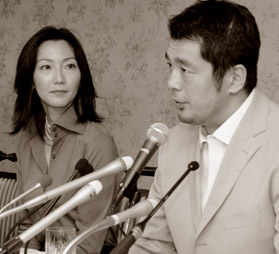Divorce fears for Japan baby boomers
|

Japanese television personality Aki Mukai, left, and her husband
Nobuhiko Takada speak to media at a Tokyo hotel in October 2006
after a Tokyo ward office rejected a lower court ruling to accept on
its registry twins born to them. Japan's Supreme Court on Friday
March 23, 2007, rejected a lower bench's ruling that would have
allowed a Japanese couple to register their twin sons _ born in the
United States to an American surrogate mother _ as their own. The
nation's top court struck down a September 2006 Tokyo High Court
decision ordering a local government to accept Aki Mukai, a
television personality, and her husband Nobuhiko Takada's
registration of their two boys, according to a copy of the ruling
posted on the Supreme Court's Web page. -AP
|
Japan expects a significant rise in the number of divorces from
April, particularly among older people, because of a change in the
pension rules coming into effect.
The new system will for the first time allow women to claim up to
half of their husband's pension if they end their marriage. Experts say
the fact that millions of baby boomers are due to give up work this
year, forcing husbands and wives to spend a lot more time together than
they ever have before, is likely to put extra strain on marriage too. In
a Tokyo dance studio, a group of Japanese women are practising the
Flamenco.
For some of them this is a hobby. For others it is an escape.
Traditionally many Japanese women have had to take on all the
responsibility for raising their family while their husbands work long
hours and drink long into the night with colleagues. Practically
speaking, many men have been absentee spouses. But now more than five
million Japanese workers (about 5% of the workforce) are about to retire
as the Baby Boom generation reaches 60.
For the first time in their lives the women at the Flamenco class
face the prospect of spending all day every day with men who have done
nothing but go out to work all their adult life. "I am so used to not
having my husband around the house I'm very worried about his
retirement, to be honest," said 59-year-old Yoshiko Yamauchi.
"When the day comes, I want to continue with my hobbies and what I
enjoy doing. I hope my husband will take up hobbies on his own when he
retires." "If we get too involved with each other it becomes too
stressful for both of us," agrees Kinuko Ito, the oldest in the group.
"That's why we want to live our lives separately but freely until the
end."
Waiting to divorce
For those wives who have had enough, or those who find that living
with a newly retired "salaryman" with nothing to do is just too hard,
divorce is not an easy option in Japan.
Shame is one reason. Financial hardship is another. "Kaoru" is single
again after years of marriage. She used a specialist divorce adviser to
help her through what was a long drawn out and difficult process. "It
took me three years to decide to do it," she says.
"The money was really important. How was I going to manage? I'd heard
that divorced women end up really poor - working as a cleaner or a maid.
Eventually I got over all the other reasons that had been stopping me,
but how to support myself after the divorce was a really big issue."
For decades the number of marriages that fail in Japan was
increasing. It peaked at around 290,000 in 2002. Then everything
changed. The trend reversed. Last year it had fallen to fewer than
260,000. Kaoru's adviser Hiromi Ikeuchi says it is obvious why.
"People are waiting. In Japan, 75% of all divorces are initiated by
women. They're waiting because if they plan to get divorced anyway they
want to wait so they get part of the pension.
"They've been waiting for three or four years, ever since the
government announced it was changing the law." It seems some husbands
could be in for a shock. Many of them do not think they are doing
anything wrong. They behave as their fathers did, as their boss does, as
their colleagues do.
Good-husband lessons
However not all Japanese men are giving up on their marriage. I met a
group of self-confessed male chauvinists in a restaurant on a Saturday
night who want to do better.
This is the Tokyo chapter of what might best be described as the
"National Chauvinistic Husbands Association". For them the battle of the
sexes is over. "We do not win. We cannot win.
We do not want to win," they chant. Over beers and steaming hot-pot
they swap tips on how to save their marriages. The association's founder
Shuichi Amano says the club has more than 1,200 members across Japan and
it is getting bigger. "The most important thing is to learn to be a good
husband," he said. "Not a chauvinist who orders his wife to prepare the
bath, the meal and the bed but one who does what he's told.
We've reached the stage where we need to have a big heart so we can
solve any problems at home." Some of the men say what they have been
taught has saved their marriage. Tanaka, 59, who teaches in a cram
school, says he is learning little by little how to treat his wife
better. "Before, there was a long distance between my wife and I," he
admits.
"But now we are getting closer and closer. I listen to what she says
to me. This network is very important and unique in Japan and in the
rest of the world."
BBC
|
